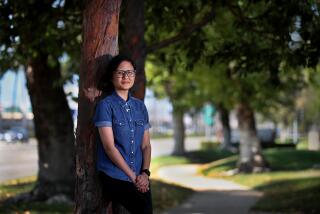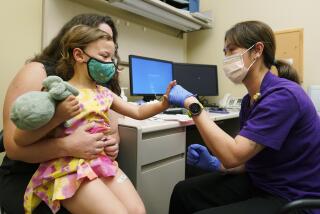Where Bigger Is Better : Clinic treats children who are abnormally short or thin. The mostly volunteer staff gives special attention to nutritional needs, and reaches into the home to find the roots of problems.
When 4-year-old Faustine Ortiguero went to the emergency room at Harbor-UCLA Medical Center with flu symptoms, doctors suggested that he get special attention.
His flu didn’t worry doctors, but the little boy’s weight did. At 30 pounds, Faustine weighed the same as the average child half his age.
The doctors referred him to the medical center’s Failure to Thrive Clinic, a program that treats children who are abnormally short or thin.
Pediatrician Carol Berkowitz launched the clinic in 1980 after years of seeing children like Faustine get treatment in the emergency for their immediate medical problems but not their ongoing malnutrition.
“These children really had nowhere to go and they really were not being evaluated,” she said. When doctors treated abnormally small children, she said, “there was a focus on ‘Oh, let me check their hormones,’ or ‘Oh, let’s get blood tests.’ ”
The Failure to Thrive program evaluates and treats children who are not growing at a normal rate. Most of the children in the program suffer because they simply don’t get enough food; many come from families too poor to adequately feed them. Some are victims of neglect and abuse. And some have digestive or hormonal problems that interfere with growth.
*
Many of the clinic’s patients have protruding ribs, gaunt faces and frail limbs. Others might look like healthy children to people who don’t know how old they are.
The staff is made up of county employees who volunteer their time to the Tuesday morning program, seeing about a dozen patients a week. The staff includes a pediatrician, a pediatric nurse practitioner, a dietitian and a clinical psychologist.
The program coordinator, who evaluates the home environment’s impact, is the only paid staff position, funded by a private foundation grant.
When examining Faustine Ortiguero one recent Tuesday, Berkowitz removed the child’s shirt to get a closer look at his frail body. His stomach appeared slightly swollen and, when he raised his skinny arms, his ribs jutted out.
“Make a muscle,” the doctor told him as she tested his strength. Faustine curled his tiny arm and resisted the doctor’s attempts to gently straighten it. “What a strong guy,” she said encouragingly.
Faustine is smaller than 90% of children his age. Though he seems to be a happy youngster with a loving mother and grandfather taking care of him, Berkowitz said he has not been getting the amount of food he needs to grow.
Through discussions with the child’s mother, Berkowitz discovered that Faustine is simply a very picky eater. Instead of encouraging him to eat the amount and type of food he needs, Berkowitz said, the mother and grandfather allow Faustine to eat only what he likes.
“When he says he doesn’t want to eat, he doesn’t eat,” Berkowitz said.
The nutritionist counseled Faustine’s mother about how to get him to eat and what foods he needs. Berkowitz prescribed an instant breakfast drink. And Faustine will return for check-ups on his growth.
As she did with Faustine’s family, Berkowitz closely observes the relationship between parents and children and asks questions on topics ranging from the child’s eating habits to possible drug use by parents.
“I never get embarrassed to ask [questions],” Berkowitz said. “You cannot know too much about a child when you’re figuring why they’re having problems with growth and development.”
Program coordinator Olga DeJesus, who conducts the home visits, also observes the interaction between children and their parents and looks at the amount and type of food in the home. She also counsels parents about nutrition and family issues that may affect the child’s health.
“The most important thing we do is taking a holistic approach and looking at all the possible factors that can be affecting the child’s growth and development,” Berkowitz said.
Once clinic workers determine the cause of a patient’s slow growth, they may make recommendations to the family or refer the family to other resources. The staff may send a letter to a school recommending two lunches for a child instead of one. Or they may help the family apply for the Women, Infants and Children Program--a federal program of financial assistance to buy food. If there is evidence of neglect or abuse, families are reported to the county.
Patients usually make their first visit to the clinic as infants, but the staff continues to track their progress through the teenage years.
More to Read
Sign up for Essential California
The most important California stories and recommendations in your inbox every morning.
You may occasionally receive promotional content from the Los Angeles Times.









